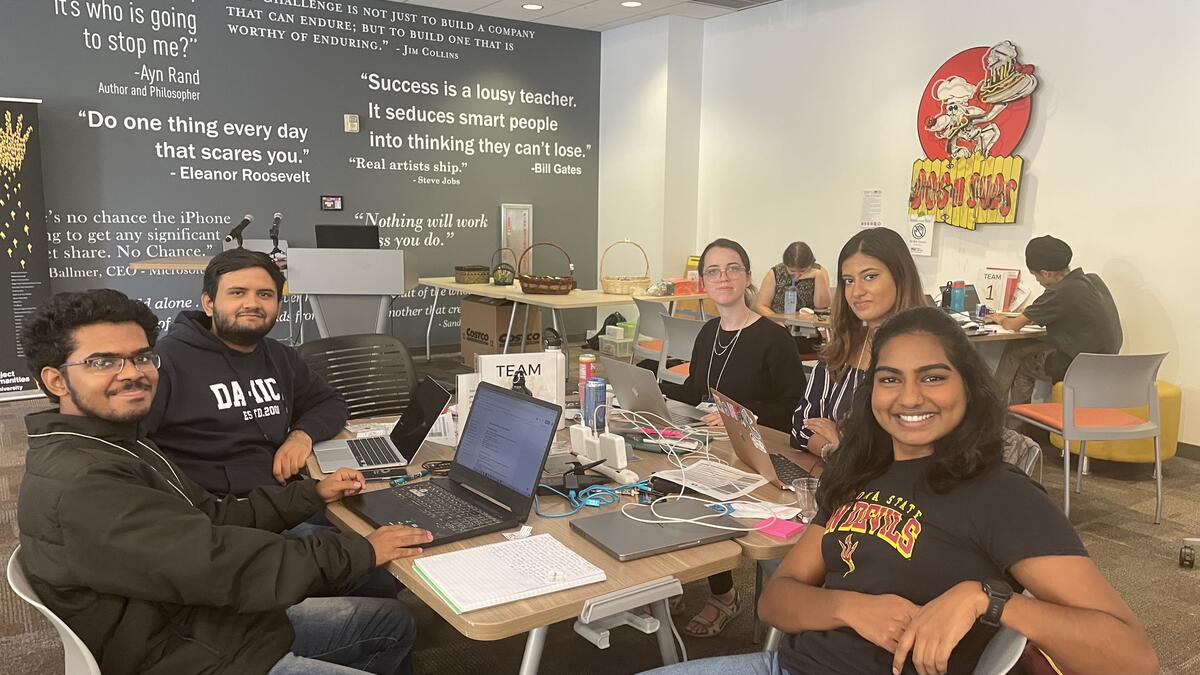The team positioned its chairs around the table and started to talk.
The Hacks for Humanity event, put on by Arizona State University’s Project Humanities, was just a couple of hours old and the team of Neha Balamurugan, Mihir Goyenka, Bhrugu Dave, Emma Williams and Sarah Tahir had to come up with a hack that, well, helped humanity.
They began discussing issues around aging and wellness, and Tahir, a paralegal, mentioned how difficult it was even for those in the legal profession to find their way through the maze of the health care industry.
“There was an issue with caregivers not being able to access resources easily,” said Balamurugan, a second-year junior at ASU majoring in computer science. “So that’s kind of what the basis for our project was.”
Thirty-six hours later, the team had invented CareUp, a prototype of an app that would allow caregivers to more easily find programs and resources in their local community.
The idea won the first-place prize at the event, which was held Oct. 7–9 at SkySong, ASU’s Scottsdale Innovation Center, and challenges participants to create solutions for local and global issues. The annual event draws some 150 to 200 participants, including students, faculty, staff, professionals and community members.
This year’s challenges were Civic Engagement, Environmental Justice, and Aging and Well-Being. Each first-place team member received $1,000.
The need for the app became obvious as the team began diving into the problem.
One example: Goyenka, who is pursuing his master’s degree at ASU in computer science, said caregivers tending to family members with Alzheimer’s can more easily find information and resources on the internet because Alzheimer’s research is highly funded and there are specific nonprofit organizations set up to support those who have the disease.
But it may not be as easy for the caregiver who is taking care of a family member who has, say, debilitating arthritis or a psychiatric disorder.
“If you look at it overall, this industry is pretty much fragmented,” Goyenka said. “There is no one-stop solution.”
“Everything that has to do with health care, whether you want to go into it from a professional standpoint or a patient standpoint is extremely, extremely difficult," added Williams, a second-year student who comes from a pre-med background but is now studying classical civilizations in ASU’s School of International Letters and Cultures. “That’s just the aim of this app. If there’s one way that we can make it simpler, then we want to do that for anyone that’s involved.”
In addition to helping caregivers take the best care of their family members, the app would help reduce the inevitable stress that arises from tending 24/7 to a loved one.
“Caregiving does not happen in a vacuum,” Balamurugan said. “Caregiving happens in addition to the personal responsibilities of the caregiver. They’re still running their own lives but also trying to take care of someone that they love and care for.
“If you’re in a mentally stressed environment, and you’re trying to take care of yourself and your family, you’re probably not even thinking there might be something out there to help you. You’re not thinking, ‘Is there a resource that can assist me?’”
How would the app work?
A caregiver would open the CareUp app and type in a keyword, such as "Alzheimer’s," along with their zip code. The search would turn up a page for caregiver information, another page for patient information and two categories of resources: government programs and private programs.
In addition, the app would use artificial intelligence to help caregivers fill out forms, a practice that can be both exhausting and confusing.
“A lot of the government websites have long descriptions that are very unintuitive,” Balamurugan said. “Our app would find a way to summarize that information and give them (caregivers) keywords to fill out the application, because how applications are initially sorted is by seeing if certain keywords are in the responses. If we’re able to simplify the application process buy telling them exactly what keyword to use, their success rate would be significantly higher.”
Clearly, an app of this magnitude can’t be fully developed in 36 hours. Hundreds if not thousands of manpower hours would be needed to compile a database of the pertinent federal programs as well as services in all 50 states.
“What we focused on was proposing the idea and delivering a pitch that this could be a viable solution,” Goyenka said.
And while team members are going their separate ways, they say they are determined to follow through on CareUp’s premise. Balamurugan said she’d like to implement CareUp in a smaller town like Guadalupe, Arizona.
“We’re not stopping here,” Williams said. “We want to keep going and pushing.”
Top photo: (From left to right) Hacks for Humanity first-place team members Mihir Goyenka, Bhrugu Dave, Emma Williams, Sarah Tahir, Neha Balamurugan.
More Science and technology

ASU postdoctoral researcher leads initiative to support graduate student mental health
Olivia Davis had firsthand experience with anxiety and OCD before she entered grad school. Then, during the pandemic and as a result of the growing pressures of the graduate school environment, she…

ASU graduate student researching interplay between family dynamics, ADHD
The symptoms of attention deficit hyperactivity disorder (ADHD) — which include daydreaming, making careless mistakes or taking risks, having a hard time resisting temptation, difficulty getting…

Will this antibiotic work? ASU scientists develop rapid bacterial tests
Bacteria multiply at an astonishing rate, sometimes doubling in number in under four minutes. Imagine a doctor faced with a patient showing severe signs of infection. As they sift through test…
